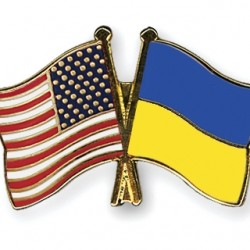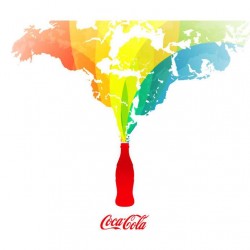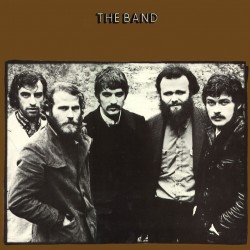selection from Buffon’s Histoire Naturelle
Translated by William Smellie (1781; 8 volumes)
Volume 5; “Of Animals Common to both Continents”
* n.b. This section corresponds to volume 7 of Buffon’s original 10 volumes.
From the preceding enumeration, it appears, that not only the quadrupeds in the warmest climates of Africa and Asia, but most of those in the temperate regions of Europe, are wanting in America. But several of our animals which can en- [123] dure cold, and multiply in the northern climates, are found in North America: And, though they differ considerably, we are obliged to acknowledge them to be the same, and to believe that they formerly passed from the one Continent to the other by lands, which are still unknown, or rather have long since been swallowed up by the ocean. This proof, drawn from natural history, is a stronger demonstration of the almost continued contiguity of these two Continents, than all the conjectures of speculative geographers.
The bears of the Illinois, of Louisiana, &c. appear to be the same with ours; only the former are smaller and blacker.
The stag of Canada, though less than ours, differs from him only by the greater height of his horns, more numerous antlers, and a longer tail.
The roebuck, which is found in the south of Canada and in Louisiana, is likewise smaller, and has a longer tail than the European kind. The Original is the same animal with the elk, though it is not equally large.
The rain-deer [sic] of Lapland, the fallow-deer of Greenland, and the caribou of Canada, appear to be the same animal. The fallow-deer or stag of Greenland, described and painted by Edwards,* has too great a resemblance to the rain-deer to be regarded as a different species. As to the caribou, though there is no exact description of it; yet, from the marks we have been able to col- [124] lect, it seems to be the same animal with the rain-deer. M. Brisson+ has made the caribou a different species, and refers it to the cervus Burgundicus of Johnston. But this cervus Burgundicus is an unknown animal, and certainly never existed either in Burgundy or in Europe: It is a simple name that has been given to some uncommon horns of the stag or fallow-deer; or rather M. Brisson may have seen the head of the caribou, whose horns consisted of one straight stem on each side, about ten inches long, with an antler or branch near the base, turned forwards; or the head of a female rain-deer; or a head of the first or second year; for the female rain-deer bears horns as well as the male, though much smaller, and, in both, the direction of the first antlers is forward; and, lastly, in this animal, as well as in all others of the deer kind, the ramifications of the horns are exactly proportioned to the number of years they have lived.
The hares, the squirrels, the hedgehogs, the otters, the marmots, the rats, the shrew-mice, and the moles, are also species common to the two Continents, though, in all these kinds, there is not an American species perfectly similar to those of Europe; and it is extremely difficult, if not impossible, to pronounce with certainty whether they are really different species, or only varieties of the same, changed by the influence of the climate. [125]
The beavers of Europe appear to be the same with those of Canada. Though these animals prefer cold countries, they can subsist, and even multiply, in temperate climates. There are still some of them in France upon the islands of the Rhone. Their number was formerly much greater; and they seem to avoid populous countries more than very warm climates. They never establish their societies but in deserts remote from the habitations of men: And, even in Canada, which may be considered as a vast desert, they have retired far from any of our settlements.
The wolf and fox are also common to both continents. They are found, but with some varieties, in all parts of North America, where there are black foxes and wolves; but all of them are smaller than those of Europe, which is the case with every animal, whether native or transported.
Though the weasel and ermine frequent the cold countries of Europe, they are at least very rare in America; but the pine-weasel, the martin, and the polecat are more numerous.
The pine-weasel of North America appears to be the same with ours. The vison, or pekan [sic] weasel of Canada, has a great resemblance to the martin; and the striped polecat of North America is perhaps only a variety of the European kind.
The American lynx seems to be the same with the European. He prefers cold countries; [126] but he likewise lives and multiplies in temperate climates, and generally frequents the forests and high mountains.
The seal, or sea-calf, seems to be confined to northern countries, and is found equally on the coasts of Europe and of North America.
These are nearly all the animals which are common to the Old and New Worlds; and from this number, which is not considerable, we ought, perhaps, to retrench more than a third part, whose species, though apparently the same, may be different in reality. But, admitting the identity of all these species with those of Europe, the number common to the two continents is very small, when compared with that of the species peculiar to each. It is farther apparent, that, of all these animals, it is those only which frequent the northern countries that are common to both Continents; and that none of those which cannot multiply in warm or temperate climates are found in both worlds.
It is, therefore, no longer a doubtful point, that the two Continents either are, or have formerly been, contiguous towards the north, and that the animals common to both have passed from the one to the other by lands with which we have now no acquaintance. We are led to believe, especially since the discoveries made by the Russians to the north of Kamtschatka, that the lands of Asia are contiguous to those of America; for the north of Europe seems to have [127] been always separated from the New World by seas too considerable to permit the passage of any quadruped. These animals, however, of North America, are not precisely the same with those of the north of Asia; but have a stronger resemblance to the quadrupeds of the north of Europe. It is the same with the animals which belong to the temperate climates. The argali, or Siberian goat, the sable, the Siberian mole, and the Chinese Musk, appear not in Hudson’s bay, nor in any other north-west part of the New Continent; but, on the contrary, we find, in the north-east parts of it, not only the animals common to the north of Europe and Asia, but likewise those which appear to be peculiar to Europe, as the elk, the rain-deer, &c. It must, however, be acknowledged, that the north-east parts of Asia are so little known, that we can have no certainty whether the animals of the north of Europe exist there or not.
We formerly remarked, as a singular phaenomenon, that the animals in the southern provinces of the New Continent, are small in proportion to those in the warm regions of the Old. There is no comparison between the size of the elephant, the rhinoceros, the hippopotamus, the camelopard, the camel, the lion, the tiger, &c. and the tapir, the cabiai, the ant-eater, the lama, the puma, the jaguar, &c. which are the largest quadrupeds of the New World: The former are four, six, eight, and ten times larger than the [128] latter. Another observation brings additional strength to this general fact: All the animals which have been transported from Europe to America, as the horse, the as, the ox, the sheep, the goat, the hog, the dog, &c. have become smaller; and those which were not transported, but went thither spontaneously, those, in a word, which are common to both Continents, as the wolf, the fox, the stag, the roebuck, the elk, &c. are also considerably less than those of Europe.
In this New World, therefore, there is some combination of elements and other physical causes, something that opposes the amplification of animated Nature: There are obstacles to the development, and perhaps to the formation of large germs. Even those which, from the kindly influences of another climate, have acquired their complete form and expansion, shrink and diminish under a niggardly sky and an unprolific land, thinly peopled with wandering savages, who, instead of using this territory as a master, had no property or empire; and, having subjected neither the animals nor the elements, nor conquered the seas, nor directed the motions of rivers, nor cultivated the earth, held only the first rank among animated beings, and existed as a creature of no consideration in Nature, a kind of weak automaton, incapable of improving or seconding her intentions. She treated them rather like a stepmother than a parent, by refusing [129] them the invigorating sentiment of love, and the strong desire of multiplying their species. For, though the American savage be nearly of the same stature with men in polished societies; yet this is not a sufficient exception to the general contraction of animated Nature throughout the whole Continent. In the savage, the organs of generation are small and feeble. He has no hair, no beard, no ardour for the female. Though nimbler than the European, because more accustomed to running, his strength is not so great. His sensations are less acute; and yet he is more timid and cowardly. He has no vivacity, no activity of mind. The activity of his body is not so much an exercise or spontaneous motion, as a necessary action produced by want. Destroy his appetite for victuals and drink, and you will at once annihilate the active principle of all his movements: He remains in stupid repose, on his limbs or couch, for whole days. It is easy to discover the cause of the scattered life of savages, and of their estrangement from society. They have been refused the most precious spark of Nature’s fire: They have no ardour for women, and, of course, no love to mankind. Unacquainted with the most lively and most tender of all attachments, their other sensations of this nature are cold and languid. Their love to parents and children is extremely weak. The bonds of the most intimate of all societies, that of the same family, are feeble; and one family [130] has no attachment to another. Hence no union, no republic, no social state, can take place among them. The physical cause of love gives rise to the morality of their manners. Their heart is frozen, their society cold, and their empire cruel. They regard their females as servants destined to labour, or as beasts of burden, whom they load unmercifully with the produce of their hunting, and oblige, without pity or gratitude, to perform labours which often exceed their strength. They have few children, and pay little attention to them. Every thing must be referred to the first cause: They are indifferent, because they are weak; and this indifference to the sex is the original stain which disgraces Nature, prevents her from expanding, and, by destroying the germs of life, cuts the root of society.
Hence man makes no exception to what has been advanced. Nature, by denying him the faculty of love, has abused and contracted him more than any other animal. But, before examining the causes of this general effect, it must be allowed, that, if Nature has diminished all the quadrupeds in the New World, she seems to have cherished reptile and enlarged the insect tribes; for, though at Senegal there are longer serpents and larger lizards than in South America, yet the difference between these animals is not near so great as that which subsists between the quadrupeds. The largest serpent of Senegal is not double the size of the Cayenne [131] serpent. But the elephant is perhaps ten times the bulk of the tapir, which is the largest quadruped of South America. With regard, however, to insects, they are no where so large as in South America. The largest spiders, beetles, caterpillars, and butterflies, are found in Cayenne and other neighbouring provinces: Here almost all insects exceed those of the Old World, not in size only, but in richness of colouring, delicacy of shades, variety of forms, number of species, and the prodigious multiplication of individuals. The toads, the frogs, and other animals of this kind, are likewise very large in America. We shall take no notice of birds and fishes; because, as Nature has enabled them to pass from the one Continent to the other, it is hardly possible to distinguish those which are proper to each. But reptiles and insects, like the quadrupeds, are confined to their respective Continents.
Let us now examine why the reptiles and insects are so large, the quadrupeds so small, and the men so cold, in the New World. These effects must be referred to the quality of the earth and atmosphere, to the degree of heat and moisture, to the situation and height of mountains, to the quantity of running and stagnant waters, to the extent of forests, and, above all, to the inert condition of Nature in that country. In this part of the globe, the heat in general is much less, and the humidity much greater. If we compare the heat and cold of every degree of [132] latitude, we shall find very considerable differences: At Quebec, for example, which is under the same degree of latitude with Paris, the rivers freeze every year some feet thick; a coat of snow still thicker covers the land for several months; the air is so cold that the birds fly off and disappear during the winter, &c. This difference of temperature under the same latitude in the Temperate Zone, though very considerable, is perhaps still less than the difference of heat under the Torrid Zone. In Senegal, the sun is perfectly scorching; while in Peru, which lies under the same line, an agreeable temperature prevails. The same remark applies to all the other latitudes. The Continent of America is so formed and situated, that every circumstance concurs in diminishing the action of heat. America contains the highest mountains, and, of course, the largest rivers in the world. These mountains form a chain which seems to bound the Continent towards the west, through its whole extent. The plains and low grounds are all situated on this side of the mountains, and run from their bottoms to the sea which separates the Continents on this side. Thus the east wind, which blows perpetually between the Tropics, arrives not in America, till it has traversed a vast ocean, by which it is greatly cooled. Hence this wind is much cooler in Brasil, Cayenne, &c. than at Senegal, Guiney, &c. where it arrives impregnated with the accumulated heat acquired from all the lands and burning sands in its passage [133] through Asia and Africa. Let us recollect what was remarked concerning the different colours of men, and particularly of the Negroes. It seemed to be demonstrated, that the greater or less degree of a tawny, brown, or black colour, depends entirely on the situation of the climate; that the Negroes of Nigritia, and those of the west coast of Africa, are blackest; because their countries are situated in such a manner, that the heat is always greater than in any other part of the globe, the east wind, before its arrival, having traversed vast tracts of land; that, on the contrary, the American Indians under the line are only tawny, and the Brasilians brown, though under the same latitude with the Negroes; because the heat of their climate is neither so great nor so constant, the east wind arriving not till after being cooled by the waters, and loaded with moist vapours. The clouds which intercept the light and heat of the sun, and the rains which refresh the air and the surface of the earth, are periodic, and continue several months in Cayenne, and other regions of South America. This first cause renders all the east coats of America much more temperate than Africa or Asia: And, after the east wind has arrived in a cool state, in traversing the plains of America, it begins to assume a greater degree of heat, when it is suddenly stopped and cooled by that enormous chain of mountains of which the western part of the New Continent is composed; so that [134] it is still colder under the line at Peru, than at Brasil, Cayenne, &c. on account of the prodigious elevation of the land. Hence the natives of Peru, Chili, &c. are less brown, red, or tawny, than those of Brasil. If these mountains were reduced to a level with the adjacent plains, the heat on the western coasts would become excessive, and we would soon find Negroes at Peru and Chili, as well as upon the west coasts of Africa.
Thus, from the situation alone of the land in the New Continent, the heat must be greatly inferior to that of the Old; and I shall now show, that there is likewise a greater degree of moisture in America. The mountains, being the highest upon the globe, and being opposed to the direction of the east wind, stop and condense all the aerial vapours, and, of course, give rise to an infinite number of springs, which, by uniting, soon form the greatest rivers in the world. Hence in the New Continent, there are more running waters, in proportion to the extent of territory, than in the Old; and this quantity of water is greatly increased for want of proper drains or outlets. The natives having neither stopped the torrents, nor directed the rivers, nor drained the marshes, the stagnating waters cover immense tracts of land, augment the moisture of the air, and diminish its heat. Besides, as the earth is every where covered with trees, shrubs, and gross herbage, it never dries. The transpiration of so many vegetables, pressed close to- [135] gether, produce immense quantities of moist and noxious exhalations. In these melancholy regions, Nature remains concealed under her old garments, and never exhibits herself in fresh attire; being neither cherished nor cultivated by man, she never opens her fruitful and beneficent womb. Here the Earth never saw her surface adorned with those rich crops, which demonstrate her fecundity, and constitute the opulence of polished nations. In this abandoned condition, every thing languishes, corrupts, and proves abortive. The air and the earth, overloaded wit humid and noxious vapours, are unable either to purify themselves, or to profit by the influences of the Sun, who darts in vain his most enlivening rays upon this frigid mass, which is not in a condition to make suitable returns to his ardour. Its powers are limited to the production of moist plants, reptiles, and insects, and can only afford nourishment to cold men and feeble animals.
The scarcity of men, therefore, in America, and most of them living like brutes, is the chief cause why the earth remains in a frigid state, and is incapable of producing the active principles of Nature. To expand the germs of the larges quadrupeds, and to enable them to grow and multiply, requires all the activity which the sun can give to a fertile earth. It is for the opposition reason, that insects, reptiles, and all the animals which wallow in the mire, whose blood [136] is watery, and which multiply in corruption, are larger and more numerous in the low, moist, and marshy lands of the New Continent.
When we reflect on these remarkable differences between the Old and New World, we are inclined to believe that the latter is actually more recent, and has continued longer than the rest of the globe under the waters of the ocean; for, if we except the enormous mountains, which appear to be monuments of the highest antiquity which this globe affords, all the low parts of this continent seem to be new lands, elevated and formed by the sediments of waters. In many places, immediately under the vegetable stratum, we find sea shells and madrepores already forming large masses of lime-stone, but which are commonly softer than our free-stone. If this continent be really as antient as the other, why was it so thinly peopled? Why were almost its whole inhabitants wandering savages? Why did the Peruvians and Mexicans, who had united into society, reckon only two or three hundred years since the existence of the first man who taught them to associate? Why are they still ignorant of the art of transmitting fats to posterity by permanent signs, since they had already discovered a method of conveying their ideas at a distance by tying knots upon cords? Why did they not reduce the lama, the pacos, and other animals, into a domestic state? Their arts, like their society, were in embryo; their [137] talents were imperfect, their ideas locked up, their organs rude, and their language barbarous. Below is a list of animals, whose names are so difficult to pronounce, that it is surprising how the Europeans could submit to the trouble of writing them.* [138]
Hence every circumstance indicates that the Americans are new men, or rather men who had been so long separated from their original country, that they had lost every idea of the part of the world from which they had issued; that the greatest part of the continent of America was new land, still untouched by the hand of man, and in which Nature had not time sufficient to accomplish her plans, or to unfold the whole extent of her productions; that the men are cold, and the animals small, because the ardour of the former, and the magnitude of the latter, depend upon the salubrity and heat of the air; and that, some centuries hence, when the lands are cultivated, the forest cut down, the courses of the rivers properly directed, and the marshes drained, this same country will become the most fertile, the most wholesome, and the richest in the whole world, as it is already in all the parts which have experienced the industry and skill of man. We mean not, however, to conclude, that large animals would then be produced. The tapir and cabiai will never acquire the magnitude of the elephant or hippopotamus. But the animals transported thither will no longer diminish, as they have formerly done. Man will gradually fill up the vacuities in these immense territories, which were perfect deserts when first discovered.
The first historians of the Spanish conquest, to augment the glory of their arms, have exag- [139] gerated prodigiously the number of the enemies they had to encounter. Can these historians persuade any man of sense, that there were millions of inhabitants in Cuba and St Domingo, when, at the same time, there was neither a monarchy, a republic, nor hardly any society among them; and that, in these two large adjacent islands, and at no great distance from the continent, there were only five species of quadrupeds, the largest of which exceeded not the size of a squirrel or a rabbit? Nothing can be a stronger proof of the empty and desert state of nature in those new lands. “We found,” says Laet, “in the island of St Domingo, but few species of quadrupeds, as the hutias, which differ not much from our rabbit, but is only a little smaller, with short erect ears, and a tail like that of a mole; — the chemi, which is nearly of the same form with the hutias, but somewhat larger;– the molui, which is smaller than the hutias;– the cori, of equal size with the rabbit; its mouth resembles that of the mole; it has no tail, and its legs are short; some of them are black, but oftener a mixture of the two; it is a domestic animal, and very tame;– besides a small kind of dogs, which were absolutely mute; their number is now much diminished, because the European dogs have destroyed them.*” [140]
“In the islands of St Domingo, Cuba, and the Antilles,” says Acosta,* “there were hardly any of the animals belonging to the continent of America, and not one that resembled those of Europe.” “All the sheep, goats, horses, oxen, and asses,” remarks Father du Tertre, “in the Antilles, in Guadaloupe, and in all the French islands, have been brought there by the people of that nation; for none were carried there by the Spaniards, because the Antilles were then so thickly covered with wood, that the cattle could find no herbage for their subsistence.”+ M. Fabry, who traversed, during fifteen months, the western territories of America, beyond the Missisippi [sic], assured me, that he often travelled three or four hundred leagues, without seeing a single man. All our military gentlemen, who travelled from Quebec to the river Ohio, and from the Ohio to Louisiana, agree, that a person may frequently travel one or two hundred leagues, in the depth of the forests, and not meet with a single family of savages. All those testimonies demonstrate the desert and melancholy state of the New Continent, even where the temperature of the climate is most agreeable. But, what is more directly to our present purpose, they destroy the posterior [141] evidence of our nomenclators, and describers of cabinets, who people the New World with the animals peculiar to the Old, and mark others as natives of particular countries where they never existed. For example, it is certain, that, in St Domingo, there was originally no quadruped larger than a rabbit; and, though there had, they would have been devoured by the European dogs, which soon became as wild and ferocious as wolves: However, to the marac or maracai of Brasil, they have given the name of the tiger-cat* of St Domingo, though it is no where found but on the continent. They have made the scaley lizard, or long-tailed manis of Java, an American animal, called tatoe by the Brasilians,+ which is peculiar to the East Indies: They maintain, that the civet,3 which is a native of the southern parts of the Old Continent, is found also in New Spain, without considering that a creature so useful, which is reared in several parts of Africa, of the Levant, and the Indies, as a domestic animal, for the purposes of collecting the musk, an important article of commerce, would not have been neglected by the Spaniards, if the civets really existed in New Spain.
But our nomenclators have likewise denied to America some animals to which she has an original [142] title. They have placed the opossum in the East Indies,* and the sloth in Ceylon,+ though these animals belong solely to the New World, and are so remarkable, the one for a sac under its belly in which it carries its young, the other for the extreme slowness of all its movements, that, if they existed in the East Indies, travellers could never have passed them over in silence. Seba relies on the authority of Francis Valantine for the East India opossum. But this authority can have no weight; for Francis Valantine was so ignorant of the quadrupeds and fishes of Amboyna, and his descriptions are so bad, that Artedi declares no use can be made of his information.
We pretend not, however, to affirm absolutely, that none of the quadrupeds in the warm climates are common to both continents. Of this we can have no physical certainty, till the whole of them be accurately examined. But it is evident, that none of the large, and very few of the small American animals, exist in the Old Continent. Besides, though there should be some exceptions, which I hardly imagine, they must be limited to a very small number of animals, and could have no influence on the general law which I mean to establish, and which seems to be the only rule for enabling us to acquire a proper knowledge of the animal kingdom. This law, [143] which leads us to judge as much by the climate and dispositions of animals, as by their figure and structure, will seldom deceive, and will enable us to avoid or detect a multiplicity of errors. Suppose the question, for example, to be concerning an Arabian animal, as the hyaena, we may safely pronounce that it exists not in Lapland; but we will never maintain, with some naturalists, that the hyaena and glutton are the same animal,* nor with Kolbe, that the cross-fox, which inhabits the most northern regions of the New Continent, is found at the Cape of Good Hope;+ and we will find, that this animal is not a fox, but a jackal: Neither should the animal, called by the same author the earth-hog, which feeds upon ants, be confounded with the ant-eaters of America: This Cape animal is probably the manis or scaley lizard,3 which has no other resemblance to the ant-eater, than that of using the same food. In the same manner, if it had been considered, that the rain-deer4 is a northern animal, this name would have never been applied to an African antelope. The phoca, or seal, which frequents the seas of the north, ought not to be found at the Cape of Good Hope.5 The genet, which is a native of Spain, Asia Minor, &c. and peculiar to the Old Con- [144] tinent, is ranked by Klein under the name of Coati,* which is an American animal. The ysquiepatl of Mexico, an animal which exhales an offensive odour, and for that reason we shall rank it with the pole-cats, should never be considered as a small fox or badger.+ The Coati mondi or America should not be confounded, as has been done by Aldrovandus,3 with the badger-hog, which is always mentioned as an European animal. But I mean not to exhibit all the errors of nomenclators: My aim is to prove, that their blunders would not have been so numerous, if they had attended to the difference of climates; if they had studied the histories of animals, and discovered, as I have done, that those of the southern parts of each Continent are never found in both; and, lastly, if they had abstained from generic names, by which numbers of species, not only different, but very remote from each other, are blended together.
Thus the genuine object of a nomenclator is not to lengthen, but to contract his list, by making impartial inquiries and comparisons. No task can be easier than to peruse all the writers o animals, and to form a table of their names and phrases, which will always be longer in proportion as the labour bestowed in vestigation [sic] is less: But nothing is more difficult than to ex- [145] amine and compare animals with that judgment and discernment, which are necessary to reduce this table to its just dimensions. I again repeat, that there are not in the whole habitable earth above two hundred species of animals, even including forty different species of monkeys. To each of these, therefore, we have only to allot a proper name; and a very indifferent memory is able to retain two hundred names. For what purpose, then, are quadrupeds arranged into classes, orders, and genera? Methodical distributions are only a kind of scaffolds invented to aid the memory in the recollection of plants, the number of which is so great, their distinctions so minute, and their species so liable to variation, that it is necessary to consider them in bundles or genera, by putting together such as have the greatest similarity to each other. As in all works of genius, what is absolutely useless, is always ill imagined, and often becomes hurtful, instead of giving names to two hundred quadrupeds, we have dictionaries loaded with such a variety of terms and phrases, that it would require more labour to explain, than was spent in composing them. Why employ a phraseological jargon, when we can speak plain language, by pronouncing simple names? Why change all the acceptation of terms, under the pretext of making classes and genera? When a genus is composed of a dozen animals, under the name, for example, of the rabbit, why is not the rabbit itself to be found there, but must [146] sought for under the genus of hare?* Is it not absurd, and even ridiculous, to fabricate classes, where genera the most remote are assembled together; for example, to unite in the first, man+ and the bat; in the second, the elephant and scaly lizard; in the third, the lion and the ferret; in the fourth, the hog and the mole; in the fifth, the rhinoceros and the rat? &c. Such heterogeneous and ill conceived ideas cannot be supported. The works, accordingly, which contain fancies so crude, have been successively destroyed by their own authors. One edition contradicts another, and the whole receive no applause but from tyros and children, who are uniformly the dupes of mystery, to whom the fopperies of method appear to be scientific, and, in fine, who respect their master in proportion to the talent he possesses of representing the clearest and most perspicuous objects under the most abstruse and dark points of view.
By comparing the fourth edition of Linnaeus’s work with the tenth, we find, that man3 is no longer ranked with the bat, but with the scaly lizard; that the elephant, the hog, and the rhinoceros, instead of being ranked, the first with the scaly lizard, the second with the mole, and the third with the rat, are all associated with the shrew-mouse.4 Instead of the five orders or classes5 of anthropomorpha, ferae, glires, ju- [147] menta, and pecora, to which he had reduced all quadupeds, the author, in this last edition, has split them into seven,* viz. primates, bruta, ferae, bestiae, glires, pecora, belluae. From these general changes, we may conceive the many alterations introduced among the genera and species, which last alone have any real existence. He says, that there are two species of men, the day-man and the night-man, homo diurnus sapiens; homo nocturnes troglodytes;+ and that these distinct species should not be regarded as varieties only.3 Is not this to add fable to absurdity, to represent the ravings of old women, or the falsehoods of credulous travellers, as constituting a principal part in the system of Nature? Is it not better to be silent with regard to matters of which we are ignorant, than to establish essential characters and general distinctions upon the grosses errors, such as, for example, that, of all animals which give suck, women alone has a clitoris?4 This is so opposite to the truth, that, of above a hundred different animals which we have dissected, not a single one wanted that part. But I have dwelt, perhaps, too long on criticisms of [148] this kind, especially as they are not my principal object. I have said enough to guard the reader against errors both of a general and particular kind, which are no where so numerous as in the works of nomenclators; because, being sollicitous [sic] to comprehend every thing within the limits of their systems, they are obliged to associate all that they are ignorant of, with the little that they know.
From what has been advanced, the following general conclusions may be drawn: That man is the only animated being on whom Nature has bestowed sufficient strength, genius, and ductility, to enable him to subsist and multiply in every climate of the earth. No other animal, it is evident, has obtained this great privilege; for, instead of multiplying every where, most of them are limited to certain climates, and even to particular countries. Man is totally a production of heaven: But the animals, in many respects, are only creatures of the earth. Those of one Continent are not found in another; or, if there are a few exceptions, the animals are so changed and contracted, that they are hardly to be recognised. Is any farther argument necessary to convince us, that the model of their form is not unalterable; that their nature, less fixed than that of man, may be varied, and even absolutely changed in a succession of ages; that, for the same reason, the least perfect, the least active, and [149] the worst defended, as well as the most delicate and heavy species, have already, or will soon disappear; for their very existence depends on the form which man gives or allows to the surface of the earth?
The prodigious mammouth [sic], whose enormous bones I have often viewed with astonishment, are which were, at least, six times larger than those of the largest elephant, has now no existence; yet the remains of him have been found in many places remote from each other, as in Ireland, Siberia, Louisiana, &c. This species was unquestionably the largest and strongest of all quadrupeds; and, since it has disappeared, how many smaller, weaker, and less remarkable species must likewise have perished, without leaving any evidence of their past existence? How many others have undergone such changes, either from degeneration or improvement, occasioned by the great vicissitudes of the earth and waters, the neglect or cultivation of Nature, the continued influence of favourable or hostile climates, that they are now no longer the same creatures? Yet the quadrupeds, next to man, are beings whose nature and form are the most permanent. Birds and fishes are subject to greater variations: The insect-tribes are liable to still greater vicissitudes: And, if we descend to vegetables, which ought not to be excluded from animated Nature, our wonder will be excited by [150] the quickness and facility with which they assume new forms.
Hence, it is not impossible, that, without inverting the order of Nature, all the animals of the New World were originally the same with those of the Old, from whom they derive their existence; but that, being afterwards separated by immense seas, or impassable lands, they would, in the progress of time, suffer all the effects of a climate that had become new to them, and must have had its qualities changed by the very causes which produced the separation, and, consequently, degenerate, &c. But these circumstances should not prevent them from being now regarded as different species of animals. From whatever cause these changes, produced by the operation of time and the influence of climate, have originated, and though we should date them from the creation itself, they are not the less real. Nature, I allow, is in a perpetual state of fluctuation: But it is enough for man to seize her in his own age, and to look backward and forward, in order to discover her former condition, and what future appearances she may probably assume.
With regard to the utility of this mode of comparing animals, it is evident, that, independent of ascertaining names, of which some examples have been given, it extends our knowledge of the animal creation, and renders it more certain and perfect; that it prevents us from ascribing, to American animals, properties which are pecu- [151] liar to those of the East-Indies, only because they have the same name; that, in examining the notices of foreign animals communicated by travellers, it will enable us to distinguish names and facts, and to refer each to its proper species; and, lastly, that it will render the history which I am now composing less defective, and perhaps more conspicuous and complete. [152]
Notes
* Nat. hist. of birds, p. 51 [back to page 124].
+ Brisson. Regn. animal. p. 91 [Note: this is the first and only note on this page. The printer departed from usual practice and denoted it with the “+” sign rather than the asterisk normally reserved for the first note. Back to page 125]
* Pelon ichiatl oquitli. The lama.
Tapiierete in Brasil, maypoury or manipouris in Guiana. The Tapir.
Tamandua-guacu in Brasil, ouariri in Guiana. The great ant-eater.
Ouatiriouaou, in Guiana. The little ant-eater.
Ouaikaré in Guiana, ai or hai in Brasil. The Sloth.
Aiotochtli in Mexico, tatu or tatupeba in Brasil, chirquinchum, in New Spain. The Armadillo.
Tatu-ete in Brasil, tatou-kabassou, in Guiana. The eight-banded Armadillo.
Macatlchichiltic or temamacama. The Antelope of New Spain.
Jiya or carigueibeju. The Brasilian otter.
Quauhtla coymatl or quapizotl in Mexico, or casigoara in Brasil. The Mexican hog.
Tlacoozclotl, or tlalocelotl. The mountain cat.
Cabianara, or capybara. The cabiai, or thick nosed-tapir.
Tlatlaubqui occlotl in Mexico, janowara or jaguara, in Brasil. The jaguar or Brasilian cat.
Cuguacu arana, or cuguacu ara, or cougouacou ara. The cuguar [sic], or brown cat.
Tlaquatzin in Mexico, aouaré in Guiana, carigueya in Brasil. The opossum.
Hoitzlaquatzin. The porcupine of New Spain.
Cuandu or gouandou, the Brasilian porcupine.
Tepe-maxtlaton in Mexico, maraguao or maracaia in Brasil. The Cayenne cat.
Quauhtechallotl thliltic, or tlilocotequillin. The black squirrel.
Quinichpatlan or assapanick. An animal resembling the flying squirrel, and is perhaps the same.
Tzquieptal. The moussette, or stiffling [sic] weasel.
Xoloitzcuintli or cuetlachtli. The Mexican wolf [back to page 138].
* L’Hist. du Nouv. Monde, par Jean Laet, liv. 1. chap. 4. p. 5. L’Hist. de l’isle Saint Domingue, par le P. Charlevoix, tom. 1. p. 35 [back to page 140].
* L’Hist nat. des Indies, par Joseph Acosta, p. 144.
+ L’Hist. gen. des Antilles, par le P. du Tertre, tom. 2. p. 289. where the reader will find many articles borrowed from Joseph Acosta [back to page 141].
* Felis silvestris, Tigrinus in Hispaniola; Seba, vol. 1. p. 77.
+ Seba, vol. 1. p. 88.
3. Brisson. Regn. anim. p. 258 [back to page 142].
* Seba, vol. 1. p. 61, 64.
+ Id. ibid. p. 54 [back to page 143].
* Regn. anim. par. Brisson, p. 234.
+ Descript. du Cap, par Kolbe, tom. 3. p. 62.
3. Id. ibid. p. 43.
4. Id. ib. p. 128.
5. Brisson, Regn. anim. p. 230. where he says, after Kolbe, that the sea is called a sea-dog by the inhabitants of the Cape of Good Hope [back to page 144].
* Klein, de quad. p. 63.
+ Seba, vol. 1. Brisson. Regn. anim. p. 255.
3. Aldrovand. quad. digit. p. 267 [back to page 145].
* Brisson. Regn. anim. p. 140. 142.
+ Lin. syst. nat. Homliae, 1758. tom, 1. p. 18. 19.
3. Id. edt. 4. p. 64.
4. Id. ibid. p. 69.
5. Id, ibid. p. 63 [Note: there is a comma rather than a period after the “id” in this note. Back to page 147].
* Lin. syst. nat. edt. x. p. 16. 17.
+ Id. ib p. 20. 24.
3. Speciem trogloditae ab homine sapiente distinctissimam, nec nostril generic illam nec sanguinis esse, statura quamvis simillimam dubium non est, ne itaque varietatem credas quam vel sola membrane nicitans absolute negat; Lyn. syst. nat. edit. x. p. 24.
4. Id. ib. p. 24. 25 [back to page 148].










